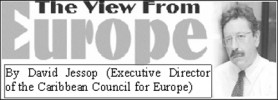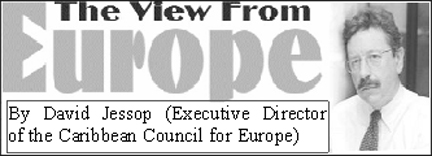Just over a year ago I wrote about the enemy within: the criminal Dons and their like who, across the Caribbean, are trying to create states within states. At the time I pointed to the ‘social’ role that these criminal godfathers have developed in deprived areas in Caribbean nations where government is unable or unwilling to provide education, employment or policing. I noted then that the activities of these people were undermining or buying the political class and were subverting states and the rule of law. I also observed that their rise was resulting, year on year, in a deterioration in the quality of Caribbean life and public safety. If no one spoke out or acted, I argued, the perpetrators would become entrenched with unforeseen consequences.
 Sadly recent events in Jamaica have proved the point. In a long and drawn-out process with some extraordinary twists – during which parts of the US government all but abandoned Jamaica to its fate – Prime Minister Golding, trapped by circumstance, decided to act. He did so very late in the day, he said out of concern for the economic consequences, but also, it seems, because of the complexity of reconciling the interests of different factions within his own party; a situation that would equally have applied to the opposition PNP had it been in government
Sadly recent events in Jamaica have proved the point. In a long and drawn-out process with some extraordinary twists – during which parts of the US government all but abandoned Jamaica to its fate – Prime Minister Golding, trapped by circumstance, decided to act. He did so very late in the day, he said out of concern for the economic consequences, but also, it seems, because of the complexity of reconciling the interests of different factions within his own party; a situation that would equally have applied to the opposition PNP had it been in government
What happened subsequently in Tivoli Gardens is well known, is tragic for all of those involved, and for Jamaica’s external image. Mr Coke, it seems, is still at large and the fight has since been broadened with the security forces now acting, with far from certain consequences, against those who control Jamaica’s other garrisons, giving rise to a fear that whoever remains may try to replicate the paramilitary gangs of the kind now seen in Mexico and Central America.
Unfortunately what has happened in Jamaica is not the end. While many would like to sweep the matter under the carpet, similar events could happen elsewhere in the region, albeit not with the same intensity but in just as damaging and traumatic ways.
Across the Caribbean, from Suriname to Belize, once peaceful and well-ordered societies have become hosts to narcotics trafficking, money laundering, extortion, gun crime, kidnapping, robbery with violence, and more recently, those who would support acts of international terrorism. The growth has been exponential and no nation has been exempt, although some so far have managed to avoid the headlines.
The origins lie largely in the Caribbean’s geographic location; its relative economic underdevelopment; the presence of significant pockets of social deprivation; and the attraction these factors all present to narcotics traffickers who are able to command sums larger than national budgets. Which is not to understate other contributory reasons, including social disaffection among youth; weak and underpaid law enforcement agencies; criminal deportees; and the cross-border trafficking of arms.
A few months before Jamaica’s government decided to enforce the US extradition request for Mr Coke, I asked a minister why it was that otherwise proper, law-abiding and religious people and their institutions had not spoken out. His response was concerning. The Don’s social role was pervasive, he said. Whether it was among the pastors who would receive small sums to support their ministry or legitimate business as that paid on demand for protection, there was a conspiracy of silence driven by fear.
These are issues that are not much debated in Caribbean society. It suggests that if important groups including the media, the church, the private sector and the academic community do not ask questions about the role and impact of well-known figures involved in criminality the perpetrators and their successors will become more entrenched, confirming that crime and its consequences are endemic.
Recent events have a number of consequences. They have brought out into the open the dark side of Caribbean society and for the first time have encouraged a debate about crime. Unfortunately, however, if you read the blogs across the region, the sense is that this is Jamaica’s problem and that similar situations do not exist elsewhere. Yet any exploration of the regional media demonstrates the all too real fact that levels of violence and criminality are now daily occurrences in every nation.
The second lesson is that the US, and by inference others outside, are prepared to see governments go to the wall if they do not act. For them the impasse over an extradition request was not a matter of sovereignty but a proof of commitment to tackling an issue that related as much to the streets of New York or London as it did to Kingston. Having provided governments in many Caribbean nations, at their request, with a wide range of security support and development assistance, external partners now require governments to act and not equivocate.
Thirdly, developments have shown once again how dependent the regional economy is on tourism. Although recent events did not touch visitors in any way, the level of negative international media coverage at a time when the industry has been experiencing a downturn, indicates how rapidly crime can bring down or at least seriously damage regional economies.
The truth is that there remains an enemy within the Caribbean which for years now has been corrupting governance, business and daily life; it threatens stability and preys on underdevelopment, turning once peaceful and virtually crime-free nations into potentially less than stable states.
Should Mr Coke survive and eventually turn up in the United States, the probability is that the near to full extent of his business dealings will become evident. This should have a sobering effect not just in his home country, but across the region, where perhaps for the first time others who associate with his like may come to recognise the implications.
Previous columns can be found at www.caribbean-council.org





